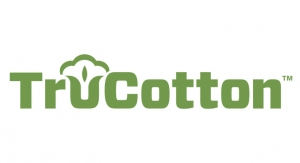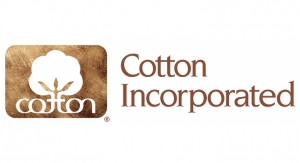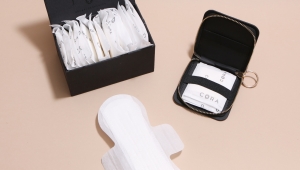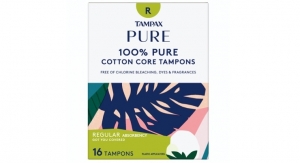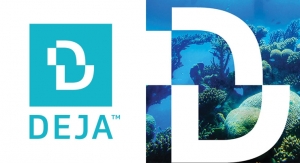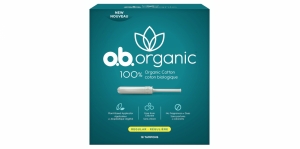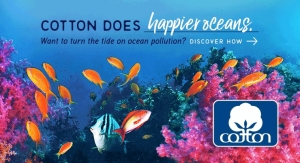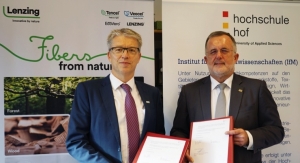Karen McIntyre, Editor06.05.19
A walk through the feminine hygiene and baby diaper aisles is proof enough that natural products are enjoying gains in the nonwovens space. In the past few months, two major feminine hygiene brands—o.b. and Tampax were the latest companies to launch cotton products. o.b. organic, featuring 100% certified organic cotton tampons, offers a new choice for women who don’t want to sacrifice protection for sustainability. All o.b. organic tampons are free from chlorine, dyes, pesticides, fragrances and BPA.
“For decades, o.b. has strived to introduce sustainable, effective solutions for periods,” says Devon Driscoll, brand manager at Edgewell Personal Care. “With the launch of o.b. organic, we are excited to now offer women 100% certified organic cotton tampons along with an innovative plant-based applicator option. We at o.b. were committed to making an applicator that is in line with our commitment to sustainability.”
Meanwhile, Procter & Gamble’s Tampax and Always brands have launched a new organic tampon and Pure pads, which are both free of dyes, fragrances and chlorine bleaching. The tampons have a 100% cotton core and the Always Pure pads are made with a cotton top layer from sustainably sourced cotton.
Tampax Pure is the brand’s first 100% organic cotton core tampon.
“I have always been a Tampax user, and period protection is the focus of my Research & Development career. I’ve tried lots of tampons, researched them, talked about them, designed them – I’ve done it all. In speaking with thousands of tampon users in the last several years, it was clear that there was still a big unmet need in the natural menstrual category – an option that worked well,” says Amy Krajewski, section head Global Tampax Research & Development.
“Many people using current options are settling, and don’t even realize it because they go on autopilot with so many other decisions to make every day. When we set out to create Tampax Pure, we took our time to develop a tampon that is not only made with a 100% organic cotton core, but that also provides Tampax protection. Users can feel good about the ingredients, and trust that our product works.”
Lawson Gary, CEO of T.J. Beall, says he believes that converters and brands are finding that consumers are requesting and expecting cotton in hygiene products. “Diaper makers are definitely seeing the benefits of hydrophobic unbleached cotton, particularly in topsheet applications where absorbent cotton fibers negatively affect rewets,” he says. “This is the best way to market cotton against the skin without deleterious effects on fluid management.”
T.J. Beall’s True Cotton unbleached cotton fibers offer converters in the nonwovens industry brilliant white color and can be blended with thermoplastics or used in 100% True Cotton substrates with no issues of “yellowing” in the final roll.
According to Janet O’Regan, director of nonwovens marketing at Cotton Incorporated, the hygiene market continues to become a more important market for cotton globally as interest in natural fibers and sustainability continues to rise.
“Consumers view cotton as the most sustainable fiber; and consumer appeal, cotton is a favorite of consumers and their favorable perceptions cross product boundaries from T-shirts to tampons,” she says. “Over recent years, consumers in Asia have stimulated the market through their demand for products made from cotton, especially products that come in contact with skin such as diapers, wipes, masks, and feminine hygiene pads
and liners.
“Even the tampon market, very small in Asia except for Japan, is growing in the Asian region as consumers trust the hypoallergenic and skin safety properties of cotton. The trend in Asia has moved around the globe and continues to build steam,” she adds.
Additionally, industry trends, led by Europe, regarding limiting the use of single-use plastics in the aquatic environments have stimulated renewed interest in cotton and other natural fibers.
The use of cotton has also remained strong in the baby care market. The launch of Pampers Pure last year represented the first use of cotton in a baby diaper product made by a national brand—Procter & Gamble—and proved what hygiene industry experts already knew—parents are looking for natural and sustainable materials to touch baby’s skin. Likewise, Johnson & Johnson’s Cotton Touch baby care products incorporated the use of cotton when the line was restaged—due to sluggish sales—
in 2018.
“The groundswell for cotton in hygiene products began with smaller brands and new businesses with corporate images and strategies focused on products that are healthy for people and the environment,” O’Regan adds, citing the launch of Kotex cotton-containing feminine hygiene products in Asia as an important trailblazer in the area. Additionally, Procter & Gamble’s recent acquisition of This is L, a cotton-based feminine hygiene brand, shows that marketing power has lifted demand for cotton to new heights.
Ginny Casstevens, director of sales and marketing at Barnhardt Manufacturing agrees that the use of cotton in private label and niche hygiene-related products has grown steadily during the past five years thanks to cotton’s soft, safe and sustainable point of differentiation from traditional hygiene products that often use synthetic fibers and polymers in their product components. New cotton hygiene products offer consumers a new choice in hygiene protection and comfort.
For example, CVS made a bold statement about cotton a few years ago when its launched their CVSHealth line of feminine hygiene products, Pure Cotton Pads and Pure Cotton Tampons. Prominently displayed on the top shelves of their feminine care aisles, this product allowed CVS to provide women with a choice that they didn’t even know existed.
The launch of CVSHealth feminine care products and the emergence of online subscription and boutique brands such as LOLA and Cora have also captured the attention of national and global brands.
“These branded product companies have the ability to communicate a broader cotton message to consumers who are now realizing that some of the products that they have been using contain materials they may not be comfortable using,” Casstevens says.
In fact, research shows that over 75% of consumers have falsely assumed that the hygiene products they use contain purified cotton because they are soft and white like cotton. Promoting the inclusion of cotton in these new products educates women that not all products use natural ingredients.
As the demand for cotton in hygiene applications increases, our customers depend on us to deliver consistent, clean and pure cotton products. Barnhardt is purifying the highest quality and grade of cotton available to the nonwovens industry specifically for markets and end use applications with extremely high standards like the hygiene market, Casstevens says.
Give Recycling a Chance
Infinited Fibers has a goal of creating sustainable options in the textile space by helping close the loop for cotton. “We are primarily targeting on high volume garment, textile applications and nonwoven materials,” says Antti Ratia, communications manager. “We are offering carbon neutral fiber regeneration technology. Our technology enables recycling of cotton-rich textiles or other cellulose based fibers (like cardboard, paper or agricultural waste) infinite times without losing the original quality. It is the only man-made fiber with cotton-like haptic and technical properties.”
Infinited Fiber can be used in several nonwoven applications when blended with polyester or cotton. One value adding quality that can be highlighted especially for nonwovens is the natural antibacterial properties.
“We have also fulfilled the fiber quality requirements for water jetted nonwoven materials,” Ratia adds. “The company’s patented CCA technology (Cellulose Carbamate) enables rapid up-scaling with minor investments into existing production facilities. Our technology and patent portfolio accommodate attractive licensing options for fiber producers.”
Ratia believes leading brands who take sustainability very seriously and not only speak but take the actions to employ new practices and materials will win as consumers love honesty and particularly younger generations require sustainable solutions.
“The trouble has been the poor availability of sustainable materials and technologies. Still, the industry has the biggest responsibility. The industry needs to make the environmentally friendly and sustainable solutions mainstream – and make them affordable to everyone – and support innovations – no one can change this industry alone,” she adds.
Lenzing Closes the Loop
Earlier this year, viscose supplier Lenzing introduced Eco Cycle technology under its specialty nonwoven brand, Veocel. Eco Cycle technology is a testament to the Veocel brand’s commitment to driving sustainability and circularity in the nonwovens industry. The technology involves the upcycling of a substantial proportion of pre-consumer cotton scraps, e.g. from garment production, and mixing with sustainably sourced wood pulp, to produce pure new virgin Veocel branded lyocell fibers for nonwoven applications.
“Since the inception of the Veocel brand, we have been pioneering the development and application of sustainable nonwoven technologies and applications. Eco Cycle technology encompasses our commitment to providing the industry with sustainable raw materials and driving circularity in the nonwovens industry ecosystem. Promoting circular economy will be a key strategy of the Lenzing Group in the long run. Eco Cycle technology will enable us to a bold new step in driving the discussion of circularity of natural botanic materials in the ecosystem,” says Jürgen Eizinger, vice president of Global Business Management Nonwovens, Lenzing AG.
Eco Cycle technology leverages Lenzing’s award-winning efficient closed-loop production process to produce virgin Veocel branded lyocell fibers with upcycled pre-consumer cotton scraps and wood pulp from sustainable sources. The process recovers more than 99% of the solvent and water in a closed loop and repeatedly feeds it back into the production process. This results in extremely low levels of emissions and absence of optical brighteners in the Veocel branded lyocell fiber production.
Veocel branded lyocell fibers have been certified Biobased by the U.S. Department of Agriculture (USDA). Blending Veocel branded Lyocell fibers with other fibers adds a greater degree of smoothness and absorbency to nonwoven fabrics, and will significantly improve the liquid absorbency in wet wipes, offering a more convenient way to clean surfaces.
Christina Kreuzwieser, head of marketing communication EU/Americas at Lenzing reports high demand within the nonwovens business, particularly in the hygiene segments were volume increased significantly thanks to the materials’ skin friendliness, odor resistance and high wet strength.
In addition to these skin friendly attributes, Lenzing products are being valued for their sustainability profile and this trend is expected to rise as discussions over plastic reduction
continue worldwide.
“Before the consumer was not aware, which fibers/materials are used. As more of society becomes more aware of ingredients, retailers and producers start to think about alternative materials – this is helping cellulose fibers, like viscose,” Kreuzwieser says.
As the closed loop trend for products continues to gain steam, Lenzing’s Eco Cycle technology is a way give nonwovens producers the chance to step into this consumer need and produce more sustainable products.
The Eco-Cycle technology was developed to produce new virgin Veocel Lyocell fibers that are certified clean & safe. These fibers for nonwoven applications offer roll-good manufacturers a convenient way to contribute to the circular economy without the necessity to engage in mechanical recycling.
Moving forward, Lenzing’s new web forming technology will help drive further sustainability efforts in the nonwovens industry. Lenzing has invested €26 million on a new web forming technology for nonwoven products. The new technology platform starts with botanic wood pulp and creates a nonwoven fabric made with 100% continuous lyocell filament. After several years of research and development, Lenzing completed the commissioning phase for a one-meter wide pilot facility located at their headquarters in Lenzing, Austria.
Sateri Targets Nonwovens
With its roots in Finland, Sateri began making fibers for nonwovens in Fujian in 2015 and by the end of 2019 the company will have three dedicated nonwovens lines with more than 200,000 tons per year.
According to marketing manager Manling Kong, expansion into nonwoven viscose fiber lies on expectation of the continuously high growth of the nonwoven market, which will be driven by growing populations, increasing disposable income, speedy life style, widening coverage and functions, and Sateri believes that the nonwovens industry will remain its double-digit growth for the next decade. Additionally, increasing environmental awareness and demand for sustainable products by consumers, which Sateri is able to meet and fulfil.
Sateri’s viscose is made from 100% certified woodpulp from sustainably-managed plantations and is fully biodegradable. All of Sateri’s mill operations have achieved the STeP by OEKO-TEX and STANDARD 100 by OEKO-TEX certifications, and is the first viscose company in the world to carry the MADE IN GREEN by OEKO-TEX product label. With this highly coveted label, Sateri’s viscose products are independently verified as safe, responsibly produced, and traceable.
All of Sateri’s mills have the Chain of Custody (CoC) certification from the Programme for the Endorsement of Forestry Certification (PEFC), and are certified under ISO 9001 and ISO 14001.
“Viscose is not only growing in nonwovens,” Kong says. “Due to its natural characteristics, viscose is used as raw material for many applications. Increasing viscose supply and decreasing cotton supply also help accelerate the growth. Nowadays, consumers pay more and more attention to product sustainability and safety, and their knowledge on nonwovens is also accelerating. This favors viscose growth as well.”
However, nonwovens is particularly attractive because of its lower penetration rate and its high growth rate. Additionally, nonwovens has a much shorter value chain. “As a raw material supplier, one of our findings is that we can easily find out which brands are using our fiber,” she says. “But for textile industry, such information is less accessible or readily available.”
Sateri has conducted tests on performance comparison among spunlaced nonwoven fabric made of viscose, cotton and polyester. The test results have shown that fabric made of viscose fiber performs much better on water absorbency, breathability, softness and smoothness. These advantages are perfect for nonwoven applications such as wipes, facial masks and other hygiene products, etc. Sateri’s viscose for nonwoven fiber has been certified by Hohenstein Institute as hypoallergenic and skin-friendly that will not irritate sensitive skin. Its products have also passed the test according to the FDA guidance and regulations that confirms it is acceptable for “food contact” applications.
Indorama Launches Recycled PET
Indorama Ventures Public Company Limited (IVL), a global chemical producer, has launched the new 100% rPET (recycled PET) brand DEJA as part of its continuous commitment to deliver responsible and sustainable growth.
IVL’s new 100% rPET fiber brand DEJA is available in various forms such as recycled flake, pellet, fiber and filament for use in multiple applications. DEJA 100% rPET products are derived by recycling 4.17 billion plastic bottles yearly and transforming them into extraordinary, innovative, product ingredients. The DEJA brand enables forward-thinking companies to make a decision based on performance and innovative future-proofed materials. IVL have been at the forefront of the process in developing the technology to convert rPET bottles into highly usable products for over 40 years. IVL’s heritage in pioneering recycling technology for global applications has ensured consistent delivery and innovation in changing and challenging environments.
The investment in and introduction of 100% rPET brand DEJA is IVL’s response to global concern around the world on environmental impact, particularly in relation to plastic. Trade customers and end consumers are increasingly demanding transparency in how the businesses that they buy from are managing their environmental responsibilities. 100% rPET brand DEJA addresses environmental responsibilities and concerns all along the value chain by offering both education and leadership; providing clear evidence that what is available for purchase and use has been produced sustainably. DEJA gives converters credibility, retailers accreditation and end consumers the assurance of sustainability with high performance as standard.
Uday Gill, CEO Fibers at IVL explains the rationale and the aims for the DEJA brand: “IVL’s heritage in pioneering recycling technology across 100% rPET flake, pellet, fiber and filament applications has enabled our performance-led product ingredients to achieve a global reputation as a quality, industry benchmark. It follows that a progressive product needs a progressive brand. We celebrate our products’ performance and proudly acknowledge their sustainability with our new premium brand DEJA whose sustainable messaging will resonate with both our converters and their customers.
“We are confident that IVL’s DEJA brand will enable conscientious converters to differentiate and to increase their margin along the supply chain, giving consumers the confidence they need to select sustainable, purposeful products.”
With unique access to IVL’s global recycling sources DEJA has complete traceability from source to supply. Recognizing plastic as a valuable resource; DEJA ingredients are made from recycling PET bottles and save millions of bottles from landfills each year. DEJA transforms plastic bottles into innovative ingredient products to protect the future with a low carbon footprint and a strong geographical imprint.
Headquartered in Bangkok, Thailand, IVL has operating sites in 31 countries on five continents and a global manufacturing footprint across Africa, Asia, Europe and North America.
The cotton industry is the mainstay of Pakistan’s economy as the fifth largest producer of cotton in the world, the fourth largest exporter of raw cotton and the fourth largest consumer of cotton. Being the prime crop of Pakistan, cotton makes textile industry the most significant industry of the country which contributes more than 60% of the export earnings of the country. Technical textiles is an emerging industry in Pakistan, where Ihsan Sons is one of the major names playing its part.
Ihsan Group is currently run by the third generation of the Ihsan family, and the fourth generation is on course to join the business with strong and proven history. The family business started in 1930 in the subcontinent and moved to Pakistan in 1947. Ihsan started in the leather and textile business with core focus around regenerated fibers. Ihsan went into exports in 1956 considering demand from foreign buyers and has continually grown over the years and expanded its operations. In 1991, Ihsan Sons (Pvt) Ltd set up a cotton bleaching plant near Lahore. Spread across 56 acres, this ultra-modern project boasts state of the art equipment from the best European manufacturers of advanced textile machinery, including Fleissner, Thies, Temafa, Autefa & Trutzschler.
In close collaboration with the German chemical giant, Pulcra, bleached cotton fiber is produced using high quality Hydrogen Peroxide to meet the standards and specifications that have been laid down in the U.K., Europe, U.S., Japanese and Russian Pharmaceutical specifications. The use of chlorine is prohibited as per company policy to maintain high quality and eco-friendly environment. From an initial modest production level of 1000 tons per year, the current level now stands at 15,000 tons making Ihsan one of the largest manufacturers of bleached cotton in the world.
To add value and harness the potential of bleached cotton in the feminine hygiene and healthcare sectors and also consistent demand from bleached cotton customers, Ihsan incorporated cotton spunlace nonwovens production in 2006 and is the first of its kind in Asia and currently the only manufacturer of cotton spunlace nonwoven in Pakistan. The unit is fully equipped with highly sophisticated technology incorporated from Fleissner, Trutzschler, Bastian and Spinnbau. The equipment manufactures fabrics weighing from 20 to 70 gsm in widths up to two meters. The annual production capacity of the line is estimated at 3000 tons.
Ihsan puts great emphasis on research and development to improve its products as a continuous function to meet the ongoing needs of its customers. Working in close collaboration with its customers, Ihsan developed fabrics under the brand names of “Belcot” – using conventional cotton and “Organicot” – using organic cotton; in plain, apertured and structured/embossed constructions from pure, natural and soft bleached cotton fibers for multiple applications.
To cater to the specific need in the feminine pads industry, Ihsan has developed a brand “Femcot” with special hydrophobic finish which enables liquid to pass one way through the product into the absorbent core, and leave the topsheet soft and dry against the skin. In addition, Ihsan also added hydrophilic finish for use in topsheets of baby diapers, pads and absorbent wipes.
“For decades, o.b. has strived to introduce sustainable, effective solutions for periods,” says Devon Driscoll, brand manager at Edgewell Personal Care. “With the launch of o.b. organic, we are excited to now offer women 100% certified organic cotton tampons along with an innovative plant-based applicator option. We at o.b. were committed to making an applicator that is in line with our commitment to sustainability.”
Meanwhile, Procter & Gamble’s Tampax and Always brands have launched a new organic tampon and Pure pads, which are both free of dyes, fragrances and chlorine bleaching. The tampons have a 100% cotton core and the Always Pure pads are made with a cotton top layer from sustainably sourced cotton.
Tampax Pure is the brand’s first 100% organic cotton core tampon.
“I have always been a Tampax user, and period protection is the focus of my Research & Development career. I’ve tried lots of tampons, researched them, talked about them, designed them – I’ve done it all. In speaking with thousands of tampon users in the last several years, it was clear that there was still a big unmet need in the natural menstrual category – an option that worked well,” says Amy Krajewski, section head Global Tampax Research & Development.
“Many people using current options are settling, and don’t even realize it because they go on autopilot with so many other decisions to make every day. When we set out to create Tampax Pure, we took our time to develop a tampon that is not only made with a 100% organic cotton core, but that also provides Tampax protection. Users can feel good about the ingredients, and trust that our product works.”
Lawson Gary, CEO of T.J. Beall, says he believes that converters and brands are finding that consumers are requesting and expecting cotton in hygiene products. “Diaper makers are definitely seeing the benefits of hydrophobic unbleached cotton, particularly in topsheet applications where absorbent cotton fibers negatively affect rewets,” he says. “This is the best way to market cotton against the skin without deleterious effects on fluid management.”
T.J. Beall’s True Cotton unbleached cotton fibers offer converters in the nonwovens industry brilliant white color and can be blended with thermoplastics or used in 100% True Cotton substrates with no issues of “yellowing” in the final roll.
According to Janet O’Regan, director of nonwovens marketing at Cotton Incorporated, the hygiene market continues to become a more important market for cotton globally as interest in natural fibers and sustainability continues to rise.
“Consumers view cotton as the most sustainable fiber; and consumer appeal, cotton is a favorite of consumers and their favorable perceptions cross product boundaries from T-shirts to tampons,” she says. “Over recent years, consumers in Asia have stimulated the market through their demand for products made from cotton, especially products that come in contact with skin such as diapers, wipes, masks, and feminine hygiene pads
and liners.
“Even the tampon market, very small in Asia except for Japan, is growing in the Asian region as consumers trust the hypoallergenic and skin safety properties of cotton. The trend in Asia has moved around the globe and continues to build steam,” she adds.
Additionally, industry trends, led by Europe, regarding limiting the use of single-use plastics in the aquatic environments have stimulated renewed interest in cotton and other natural fibers.
The use of cotton has also remained strong in the baby care market. The launch of Pampers Pure last year represented the first use of cotton in a baby diaper product made by a national brand—Procter & Gamble—and proved what hygiene industry experts already knew—parents are looking for natural and sustainable materials to touch baby’s skin. Likewise, Johnson & Johnson’s Cotton Touch baby care products incorporated the use of cotton when the line was restaged—due to sluggish sales—
in 2018.
“The groundswell for cotton in hygiene products began with smaller brands and new businesses with corporate images and strategies focused on products that are healthy for people and the environment,” O’Regan adds, citing the launch of Kotex cotton-containing feminine hygiene products in Asia as an important trailblazer in the area. Additionally, Procter & Gamble’s recent acquisition of This is L, a cotton-based feminine hygiene brand, shows that marketing power has lifted demand for cotton to new heights.
Ginny Casstevens, director of sales and marketing at Barnhardt Manufacturing agrees that the use of cotton in private label and niche hygiene-related products has grown steadily during the past five years thanks to cotton’s soft, safe and sustainable point of differentiation from traditional hygiene products that often use synthetic fibers and polymers in their product components. New cotton hygiene products offer consumers a new choice in hygiene protection and comfort.
For example, CVS made a bold statement about cotton a few years ago when its launched their CVSHealth line of feminine hygiene products, Pure Cotton Pads and Pure Cotton Tampons. Prominently displayed on the top shelves of their feminine care aisles, this product allowed CVS to provide women with a choice that they didn’t even know existed.
The launch of CVSHealth feminine care products and the emergence of online subscription and boutique brands such as LOLA and Cora have also captured the attention of national and global brands.
“These branded product companies have the ability to communicate a broader cotton message to consumers who are now realizing that some of the products that they have been using contain materials they may not be comfortable using,” Casstevens says.
In fact, research shows that over 75% of consumers have falsely assumed that the hygiene products they use contain purified cotton because they are soft and white like cotton. Promoting the inclusion of cotton in these new products educates women that not all products use natural ingredients.
As the demand for cotton in hygiene applications increases, our customers depend on us to deliver consistent, clean and pure cotton products. Barnhardt is purifying the highest quality and grade of cotton available to the nonwovens industry specifically for markets and end use applications with extremely high standards like the hygiene market, Casstevens says.
Give Recycling a Chance
Infinited Fibers has a goal of creating sustainable options in the textile space by helping close the loop for cotton. “We are primarily targeting on high volume garment, textile applications and nonwoven materials,” says Antti Ratia, communications manager. “We are offering carbon neutral fiber regeneration technology. Our technology enables recycling of cotton-rich textiles or other cellulose based fibers (like cardboard, paper or agricultural waste) infinite times without losing the original quality. It is the only man-made fiber with cotton-like haptic and technical properties.”
Infinited Fiber can be used in several nonwoven applications when blended with polyester or cotton. One value adding quality that can be highlighted especially for nonwovens is the natural antibacterial properties.
“We have also fulfilled the fiber quality requirements for water jetted nonwoven materials,” Ratia adds. “The company’s patented CCA technology (Cellulose Carbamate) enables rapid up-scaling with minor investments into existing production facilities. Our technology and patent portfolio accommodate attractive licensing options for fiber producers.”
Ratia believes leading brands who take sustainability very seriously and not only speak but take the actions to employ new practices and materials will win as consumers love honesty and particularly younger generations require sustainable solutions.
“The trouble has been the poor availability of sustainable materials and technologies. Still, the industry has the biggest responsibility. The industry needs to make the environmentally friendly and sustainable solutions mainstream – and make them affordable to everyone – and support innovations – no one can change this industry alone,” she adds.
Lenzing Closes the Loop
Earlier this year, viscose supplier Lenzing introduced Eco Cycle technology under its specialty nonwoven brand, Veocel. Eco Cycle technology is a testament to the Veocel brand’s commitment to driving sustainability and circularity in the nonwovens industry. The technology involves the upcycling of a substantial proportion of pre-consumer cotton scraps, e.g. from garment production, and mixing with sustainably sourced wood pulp, to produce pure new virgin Veocel branded lyocell fibers for nonwoven applications.
“Since the inception of the Veocel brand, we have been pioneering the development and application of sustainable nonwoven technologies and applications. Eco Cycle technology encompasses our commitment to providing the industry with sustainable raw materials and driving circularity in the nonwovens industry ecosystem. Promoting circular economy will be a key strategy of the Lenzing Group in the long run. Eco Cycle technology will enable us to a bold new step in driving the discussion of circularity of natural botanic materials in the ecosystem,” says Jürgen Eizinger, vice president of Global Business Management Nonwovens, Lenzing AG.
Eco Cycle technology leverages Lenzing’s award-winning efficient closed-loop production process to produce virgin Veocel branded lyocell fibers with upcycled pre-consumer cotton scraps and wood pulp from sustainable sources. The process recovers more than 99% of the solvent and water in a closed loop and repeatedly feeds it back into the production process. This results in extremely low levels of emissions and absence of optical brighteners in the Veocel branded lyocell fiber production.
Veocel branded lyocell fibers have been certified Biobased by the U.S. Department of Agriculture (USDA). Blending Veocel branded Lyocell fibers with other fibers adds a greater degree of smoothness and absorbency to nonwoven fabrics, and will significantly improve the liquid absorbency in wet wipes, offering a more convenient way to clean surfaces.
Christina Kreuzwieser, head of marketing communication EU/Americas at Lenzing reports high demand within the nonwovens business, particularly in the hygiene segments were volume increased significantly thanks to the materials’ skin friendliness, odor resistance and high wet strength.
In addition to these skin friendly attributes, Lenzing products are being valued for their sustainability profile and this trend is expected to rise as discussions over plastic reduction
continue worldwide.
“Before the consumer was not aware, which fibers/materials are used. As more of society becomes more aware of ingredients, retailers and producers start to think about alternative materials – this is helping cellulose fibers, like viscose,” Kreuzwieser says.
As the closed loop trend for products continues to gain steam, Lenzing’s Eco Cycle technology is a way give nonwovens producers the chance to step into this consumer need and produce more sustainable products.
The Eco-Cycle technology was developed to produce new virgin Veocel Lyocell fibers that are certified clean & safe. These fibers for nonwoven applications offer roll-good manufacturers a convenient way to contribute to the circular economy without the necessity to engage in mechanical recycling.
Moving forward, Lenzing’s new web forming technology will help drive further sustainability efforts in the nonwovens industry. Lenzing has invested €26 million on a new web forming technology for nonwoven products. The new technology platform starts with botanic wood pulp and creates a nonwoven fabric made with 100% continuous lyocell filament. After several years of research and development, Lenzing completed the commissioning phase for a one-meter wide pilot facility located at their headquarters in Lenzing, Austria.
Sateri Targets Nonwovens
With its roots in Finland, Sateri began making fibers for nonwovens in Fujian in 2015 and by the end of 2019 the company will have three dedicated nonwovens lines with more than 200,000 tons per year.
According to marketing manager Manling Kong, expansion into nonwoven viscose fiber lies on expectation of the continuously high growth of the nonwoven market, which will be driven by growing populations, increasing disposable income, speedy life style, widening coverage and functions, and Sateri believes that the nonwovens industry will remain its double-digit growth for the next decade. Additionally, increasing environmental awareness and demand for sustainable products by consumers, which Sateri is able to meet and fulfil.
Sateri’s viscose is made from 100% certified woodpulp from sustainably-managed plantations and is fully biodegradable. All of Sateri’s mill operations have achieved the STeP by OEKO-TEX and STANDARD 100 by OEKO-TEX certifications, and is the first viscose company in the world to carry the MADE IN GREEN by OEKO-TEX product label. With this highly coveted label, Sateri’s viscose products are independently verified as safe, responsibly produced, and traceable.
All of Sateri’s mills have the Chain of Custody (CoC) certification from the Programme for the Endorsement of Forestry Certification (PEFC), and are certified under ISO 9001 and ISO 14001.
“Viscose is not only growing in nonwovens,” Kong says. “Due to its natural characteristics, viscose is used as raw material for many applications. Increasing viscose supply and decreasing cotton supply also help accelerate the growth. Nowadays, consumers pay more and more attention to product sustainability and safety, and their knowledge on nonwovens is also accelerating. This favors viscose growth as well.”
However, nonwovens is particularly attractive because of its lower penetration rate and its high growth rate. Additionally, nonwovens has a much shorter value chain. “As a raw material supplier, one of our findings is that we can easily find out which brands are using our fiber,” she says. “But for textile industry, such information is less accessible or readily available.”
Sateri has conducted tests on performance comparison among spunlaced nonwoven fabric made of viscose, cotton and polyester. The test results have shown that fabric made of viscose fiber performs much better on water absorbency, breathability, softness and smoothness. These advantages are perfect for nonwoven applications such as wipes, facial masks and other hygiene products, etc. Sateri’s viscose for nonwoven fiber has been certified by Hohenstein Institute as hypoallergenic and skin-friendly that will not irritate sensitive skin. Its products have also passed the test according to the FDA guidance and regulations that confirms it is acceptable for “food contact” applications.
Indorama Launches Recycled PET
Indorama Ventures Public Company Limited (IVL), a global chemical producer, has launched the new 100% rPET (recycled PET) brand DEJA as part of its continuous commitment to deliver responsible and sustainable growth.
IVL’s new 100% rPET fiber brand DEJA is available in various forms such as recycled flake, pellet, fiber and filament for use in multiple applications. DEJA 100% rPET products are derived by recycling 4.17 billion plastic bottles yearly and transforming them into extraordinary, innovative, product ingredients. The DEJA brand enables forward-thinking companies to make a decision based on performance and innovative future-proofed materials. IVL have been at the forefront of the process in developing the technology to convert rPET bottles into highly usable products for over 40 years. IVL’s heritage in pioneering recycling technology for global applications has ensured consistent delivery and innovation in changing and challenging environments.
The investment in and introduction of 100% rPET brand DEJA is IVL’s response to global concern around the world on environmental impact, particularly in relation to plastic. Trade customers and end consumers are increasingly demanding transparency in how the businesses that they buy from are managing their environmental responsibilities. 100% rPET brand DEJA addresses environmental responsibilities and concerns all along the value chain by offering both education and leadership; providing clear evidence that what is available for purchase and use has been produced sustainably. DEJA gives converters credibility, retailers accreditation and end consumers the assurance of sustainability with high performance as standard.
Uday Gill, CEO Fibers at IVL explains the rationale and the aims for the DEJA brand: “IVL’s heritage in pioneering recycling technology across 100% rPET flake, pellet, fiber and filament applications has enabled our performance-led product ingredients to achieve a global reputation as a quality, industry benchmark. It follows that a progressive product needs a progressive brand. We celebrate our products’ performance and proudly acknowledge their sustainability with our new premium brand DEJA whose sustainable messaging will resonate with both our converters and their customers.
“We are confident that IVL’s DEJA brand will enable conscientious converters to differentiate and to increase their margin along the supply chain, giving consumers the confidence they need to select sustainable, purposeful products.”
With unique access to IVL’s global recycling sources DEJA has complete traceability from source to supply. Recognizing plastic as a valuable resource; DEJA ingredients are made from recycling PET bottles and save millions of bottles from landfills each year. DEJA transforms plastic bottles into innovative ingredient products to protect the future with a low carbon footprint and a strong geographical imprint.
Headquartered in Bangkok, Thailand, IVL has operating sites in 31 countries on five continents and a global manufacturing footprint across Africa, Asia, Europe and North America.
The cotton industry is the mainstay of Pakistan’s economy as the fifth largest producer of cotton in the world, the fourth largest exporter of raw cotton and the fourth largest consumer of cotton. Being the prime crop of Pakistan, cotton makes textile industry the most significant industry of the country which contributes more than 60% of the export earnings of the country. Technical textiles is an emerging industry in Pakistan, where Ihsan Sons is one of the major names playing its part.
Ihsan Group is currently run by the third generation of the Ihsan family, and the fourth generation is on course to join the business with strong and proven history. The family business started in 1930 in the subcontinent and moved to Pakistan in 1947. Ihsan started in the leather and textile business with core focus around regenerated fibers. Ihsan went into exports in 1956 considering demand from foreign buyers and has continually grown over the years and expanded its operations. In 1991, Ihsan Sons (Pvt) Ltd set up a cotton bleaching plant near Lahore. Spread across 56 acres, this ultra-modern project boasts state of the art equipment from the best European manufacturers of advanced textile machinery, including Fleissner, Thies, Temafa, Autefa & Trutzschler.
In close collaboration with the German chemical giant, Pulcra, bleached cotton fiber is produced using high quality Hydrogen Peroxide to meet the standards and specifications that have been laid down in the U.K., Europe, U.S., Japanese and Russian Pharmaceutical specifications. The use of chlorine is prohibited as per company policy to maintain high quality and eco-friendly environment. From an initial modest production level of 1000 tons per year, the current level now stands at 15,000 tons making Ihsan one of the largest manufacturers of bleached cotton in the world.
To add value and harness the potential of bleached cotton in the feminine hygiene and healthcare sectors and also consistent demand from bleached cotton customers, Ihsan incorporated cotton spunlace nonwovens production in 2006 and is the first of its kind in Asia and currently the only manufacturer of cotton spunlace nonwoven in Pakistan. The unit is fully equipped with highly sophisticated technology incorporated from Fleissner, Trutzschler, Bastian and Spinnbau. The equipment manufactures fabrics weighing from 20 to 70 gsm in widths up to two meters. The annual production capacity of the line is estimated at 3000 tons.
Ihsan puts great emphasis on research and development to improve its products as a continuous function to meet the ongoing needs of its customers. Working in close collaboration with its customers, Ihsan developed fabrics under the brand names of “Belcot” – using conventional cotton and “Organicot” – using organic cotton; in plain, apertured and structured/embossed constructions from pure, natural and soft bleached cotton fibers for multiple applications.
To cater to the specific need in the feminine pads industry, Ihsan has developed a brand “Femcot” with special hydrophobic finish which enables liquid to pass one way through the product into the absorbent core, and leave the topsheet soft and dry against the skin. In addition, Ihsan also added hydrophilic finish for use in topsheets of baby diapers, pads and absorbent wipes.

